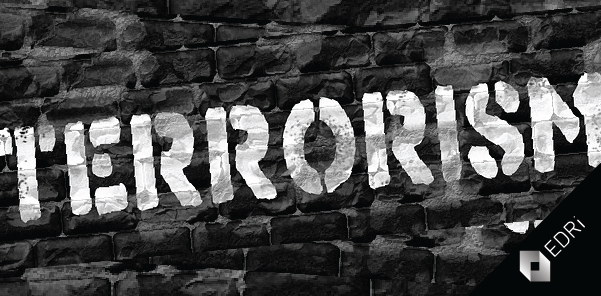EU Parliament’s anti-terrorism draft Report raises major concerns
While the recommendations of the final Report will not be binding, it sets a bad precedent for EU citizens prior to the elections, and its impact could be greater than that of most other political statements.
In June 2018, Member of the European Parliament (MEP) Rapporteurs Monika Hohlmeier (EPP) and Helga Stevens (ECR) released their draft Report of the rather secret work carried out by the European Parliament’s Special Committee on Terrorism (TERR). The draft Report attracted more than 1500 amendments, which proves that political groups in the TERR Committee disagree on how to move forward on the EU counter-terrorism policies. While the recommendations of the final Report will not be binding, it sets a bad precedent for EU citizens prior to the elections, and its impact could be greater than that of most other political statements.
A draft Report that ignores the fundamental rights mandate of the TERR Committee
The TERR Committee had a mandate “to assess the impact of the EU anti-terrorism legislation and its implementation on fundamental rights”. The draft Report, however, does not deliver such assessment.
From a digital rights perspective, the draft Report contains numerous worrying recommendations, statements and approaches to counter-terrorism. It is problematic for several reasons. For example, it encourages the “next President of the Commission to maintain a self-standing portfolio for the Commissioner for Security Union” – a portfolio currently held by the UK Commissioner Sir Julian King, who has been pushing several worrisome proposals for fundamental rights in the digital environment, such as the new draft Terrorism Regulation. In addition, the text encourages privatised law enforcement; it promotes the expansion of illegal data retention; it encourages eroding encryption; it promotes the creation of an EU Big Brother database hidden behind “interoperability” proposals that the European Data Protection Supervisor has strongly criticised; it supports the flawed Commission proposals on cross-border access to data or “e-evidence” that have been criticised by most stakeholders and most recently by the European Data Protection Board; it encourages the extension of the Passenger Name Records (PNR) profiling, despite the 2017 Court of Justice of the European Union (CJEU) Opinion on this matter; it encourages and it even portrays a false image of fundamental rights, by for example saying that between security and the fundamental right to privacy, security should prevail.
Luckily, there are 1519 amendments to change this draft Report. However, among the large number of amendments, there are some that, if adopted, would make the draft Report even worse. For example, there are amendments that ask for decryption or the implementation of encryption backdoors for “law enforcement”. Assuming that undermining security and privacy will help to uphold security while fighting terrorism is not rational.
Coincidental, problematic similarities
One of the interesting parts of the draft Report is that it contains many resemblances with the draft Regulation on preventing and tackling the dissemination of “terrorist content” online proposed by the Commission on 12 September 2018. Both texts specifically focus obliging internet service providers to remove terrorist content within a maximum one hour. Both texts limit transparency obligations to simply how many removals providers conducted and how quickly were these actions taken. While the Rapporteurs in TERR affirm that “the limit of voluntary action of companies has been reached”, the explanatory memorandum of the proposed Regulation states that “the voluntary arrangements have also shown their limitations”. Both texts put a light on the role of “smaller platforms” in this policy challenge as well as of “automated means”. Either the Rapporteurs had a crystal ball to know what the European Commission was about to say, this is a mere “coincidence”, or something else.
The fact that the TERR Committee draft’s “spontaneously” chose to propose similar wording to what the Commission proposed is important. It means that the two rapporteurs have led the European Parliament a long way towards adopting a position that fully aligns with the terms of the proposed Terrorist content Regulation before the vast majority of Parliamentarians were aware of what the Commission was about to propose as binding legislation. If deliberate, this would be a serious attack on institutional integrity of the European Parliament.
The TERR Report risks being a missed opportunity
Overall, the draft Report misses an important call for sober analysis of the current situation of counter-terrorism policies vis-à-vis fundamental rights and for evidence-based policy-making. A lot would have to change for the TERR Committee to have been proven useful and abide by the responsibilities conferred by the European Parliament in July 2017. The Committee is expected to consider compromise amendments on 15 October 2018 and have a vote on the draft Report and the tabled amendments on 12 November 2018. The whole Parliament would be asked to vote on it in December.

Draft report on findings and recommendations of the Special Committee on Terrorism (21.06.2018)
http://www.europarl.europa.eu/sides/getDoc.do?pubRef=-%2f%2fEP%2f%2fNONSGML%2bCOMPARL%2bPE-621.073%2b01%2bDOC%2bPDF%2bV0%2f%2fEN
European Parliament – fighting terrorism with closed-door secrecy (07.02.2018)
https://edri.org/european-parliament-fighting-terrorism-with-closed-door-secrecy/
(Contribution by Maryant Fernández Pérez, EDRi, and Chloé Berthelemy, EDRi intern)


